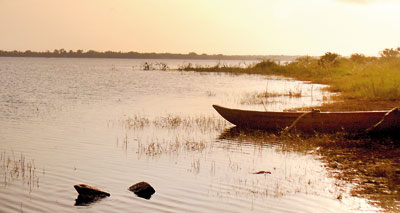News
Modern use of ancient tanks a world best-practice model
Sri Lanka’s modern farming use of rainwater stored in ancient tanks is a best practice strategy to combat the effects of climate change, says CGIAR, a global partnership of research bodies – but an expert warns that we are ruining this precious legacy. CGIAR’s research programme on Climate Change, Agriculture and Food Security (CCAFS) outlines methods for farmers to adapt to shifts in climate despite uncertain growing conditions in coming years.

Above and below: Tanks built by our ancestors a rich heritage of water storage
Research carried out by Colombo-based International Water Management Institute (IWMI) a CGIAR partner with CCAFS, was a key contributor to the study. “We have a rich heritage of water storage in Sri Lanka,” said Nishadi Eriyagama, a water resources engineer at International Water Management Institute (IWMI) who also contributed to the study.
“But according to recent research, half of all the 18,000 tanks in the dry zone are abandoned or in need of repair. So there is both a huge challenge and a great opportunity to revive these systems to help us adapt to climate change.’ The CCAFS report ties in with Sri Lanka’s own National Climate Change Adaptation strategy (NCCAS) prepared in 2011 which, among several other strategies to battle climate change, recommends returning to ancient water storage systems.
Professor Andy Challinor of Leeds University, who co-leads research on climate adaptation at CCAFS, said getting farmers and other stakeholders to embrace various adaptation strategies could “end up being equally or more important than seeking higher levels of scientific certainty from a climate model”.
“In Sri Lanka,” Dr Challinor said, “adapting without regrets started with knowing farmer capabilities and vulnerabilities. “Despite limited resources, the government’s adaptation plan is giving farmers a head-start because of its practical approach. Better water capture and management on the farms is translating to better preparation for more extreme weather conditions; better food security for the nation is the result.”
The report notes that the agriculture sector in Sri Lanka, which accounts for almost one-third of employment and one-eighth of gross domestic product, “faces uncertainly in the near-term as projections for precipitation and temperature vary dramatically”.
It goes on: “Instead of delaying a decision until more certainty emerges, government planners looked at the frequency of historical exposure to climate hazards … and identified the need for improved water management as an agricultural adaptation strategy that would be beneficial regardless of how climate changes shaped the precipitation in the future.
“The government then worked with smallholder farmers on a range of adaptive measures that have addressed agriculture water usage for centuries. Ancient Sri Lankan kingdoms used large above-ground tanks to collect and store rainwater for use in drier times; farmers implemented this solution with great success.”
Data published in Sri Lanka’s second National Communication on Climate Change shows a trend in decreasing rainfall and predicts that climate change will make the dry zone drier and the wet zone wetter. Unfortunately for us, several crops, including paddy, are cultivated mainly in the dry zone and could be directly affected by uncertain weather patterns.
Despite the huge amount evidence pointing to man-made climate change as a reality, there is a great deal of uncertainty among researchers about its effects. That’s a problem for policy makers who are looking for firm recommendations to guide them, hence the development of CCAFS’s “no regrets” approaches that will help farmers whatever the outcome of climate change.
“Climate projections will always have a degree of uncertainty, but we need to stop using uncertainty as a rationale for inaction,” says Dr Sonja Vermeulen, head of research at CCAFS and lead author of the new study.
Follow @timesonlinelk
comments powered by Disqus

